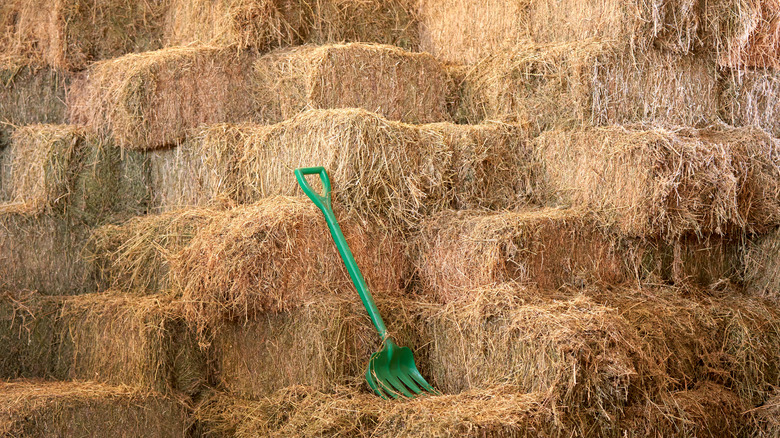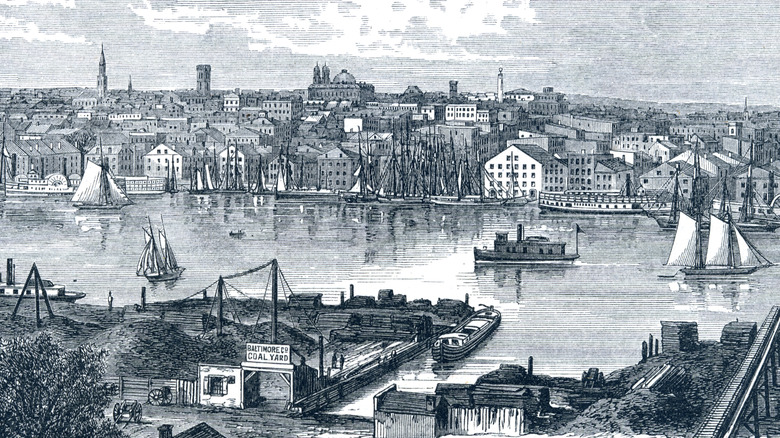The Bizarre Thing That's Illegal To Toss Out Of Windows In Baltimore, Maryland
To those living outside of Maryland, it might not be clear what Baltimore is all about. It's an old, historical city, right? It's the other big city in Maryland besides Washington, D.C. (but wait, Washington, D.C. isn't inside Maryland because technically it's a separate territory). And, uh.... maybe Baltimore means the Ravens and some seafood? Also, it's got this big harbor that's all but defined the city since its early days. It's this last point that brings us around to a Baltimore law (Maryland has lots of weird ones) that might seem strange on the surface, but actually makes a lot of sense: No chucking bales from windows higher than the first floor.
To be specific, the law code in question states that, "It shall not be lawful for any person to throw any bale or bulky article from the 2nd or higher story door or window into the street," per Section 50.4 of Article 19 (Police Ordinances) published by the Baltimore City Department of Legislative Reference. This revision dates to September 30, 2024, so as of this writing, we know that this is the law exactly as it currently reads.
Note that the law doesn't say "hay" specifically, so "bales" could refer to a multitude of items that can be baled (wrapped and stacked in a bundle). Nowadays, this includes textiles, cardboard, aluminum, plastics, and other recyclables. Many of those items didn't exist in 1871 Baltimore, when the law was first made, but other items did — especially in a port city. It was probably just safer to make sure people didn't get lazy and hurl heavy objects set for transport out of tall buildings.
No chucking bales from the second floor
Looking deeper at Section 50.4 of Article 19 of Baltimore's legal code, the header of the section in question reads, "Throwing bales, etc.; using slides, etc.," which could cover quite a lot of items not specifically mentioned in the legislation. Throwing "bales" or "bulky" items in (a)(1) covers quite a lot, too, and could feasibly make sure people don't do dumb things like hurl pianos or sofas from the second, third, fourth floor, etc.
Section 50.4 (a)(2) indicates that, yes, this law was devised because of Baltimore's port-based shipping history. It refers to the prohibited use of "any sliding board, skid, or other device or contrivance for the purpose of receiving or delivering merchandise." The ban against using such devices applies to "in or upon any street, lane, or alley, wharf, or place of public," either directly or indirectly. That also covers quite a lot. And if you're wondering why a "sliding board" is of particular concern in Baltimore: It's pretty flat, but it does slope down a bit toward sea level at the harbor, especially from Pimlico in the northwest. It's easy to imagine some black-and-white comedy where a Baltimore dude is racing downslope ahead of a sliding bed or something.
However, even the strictest of laws sometimes have wiggle room. In this case, (b) makes an exception for chucking "any merchandise or other article" out of high windows to save them from a fire. But no worries, the penalty isn't too severe if you disobey this particular law, anyway. It's $20 per violation, and that's that.
The unknown origin of the bale law
There's no specific incident on record that pushed the city of Baltimore drafting its "no chucking bales from the second floor" law. There's no tragedy like, "Mr. Stern and his family were crushed to death by 25 bales of fine silk last Tuesday whilst striding Baltimore's streets." We can also assume that the bales in question were not likely to be hay, because Baltimore was always a mercantile, urbanized city — even going back to the mid-18th century. The farmland with the horses, cows, hay, etc, was located around the city, which made transportation of goods to and from Baltimore and its harbor ideal. And, we're also guessing that the reach of Baltimore's bale law didn't extend beyond its city limits and into people's private farms.
By 1871, when the bale law was drafted, Baltimore had far greater dangers to worry about than rogue textiles hurled from upper floors. 1853, 1855, 1856, and 1877 all saw major train disasters hit the city, caused by a combination of farm animals on train tracks (not their hay bales), bad weather, and a scheduling error. At the same time, Baltimore saw an explosion of urban congestion in the 1870s and 1880s, which would have meant lots of good targets for accidental assassination roaming the streets below one's window. But no matter the cause, Baltimore's law against chucking bales from windows was and is probably a sensible one.


